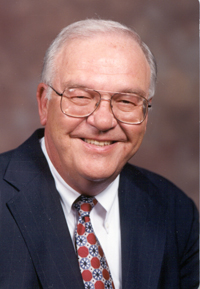 |
L.Dennis Smith, Ph.D. |
The course, “The Reversibility of the Differentiated State and Stem Cell Formation,” will focus on the fundamentals of regulating gene expression in stem cells and certain differentiating cells.
Dr. Smith also will explore how gene regulation can be controlled, or even reversed, to maintain a purer stem cell state. Lectures will be from 1:30 to 3 p.m., Tuesdays and Thursdays from Sept. 16 to Oct. 9, in the Durham Research Center, Room 8003.
Dr. Smith, professor of biological sciences at the University of Nebraska-Lincoln, also will be available to consult with stem cell researchers and post-docs who want to learn about the future of the field and its available career opportunities.
Tom Rosenquist, Ph.D., vice chancellor of research, invited Dr. Smith to UNMC.
“His expertise will add to the mass of strong basic sciences that already characterizes our work,” Dr. Rosenquist said. “Regenerative medicine and stem cell biology are the most important issues in 21st-century biomedical sciences, and UNMC scientists have been leaders in this work for many years. We are in the process of expanding our research and clinical enterprises in this key area.”
Consultations will be held in the same room from 1 to 5 p.m., Monday, Wednesday and Friday, between Sept. 15 and Oct. 10.
E-mail Dr. Smith to make an appointment at ldsmith@nebraska.edu.
President of the University of Nebraska from 1994 to 2004, Dr. Smith was a staunch supporter of stem cell research in 1999, when medical research being conducted at UNMC came under fire. The research, designed to shed light on neurodegenerative diseases such as Alzheimer’s, Parkinson’s, AIDS dementia and multiple sclerosis, relied on fetal tissue.
|
In response, Dr. Smith outlined the critical need for the research. The request to cease the research, Dr. Smith wrote, “strikes at the very heart of academic freedom.”
The Board of Regents subsequently voted unanimously to support the research. Dr. Smith continues to champion the right of scientists to pursue new knowledge in a responsible manner, and in a climate of academic openness.
For his stand, Dr. Smith was presented with the highly coveted American Association for the Advancement of Science Award for Scientific Freedom and Responsibility in 2002. The award honors scientists and engineers whose exemplary actions, often taken at significant personal cost, have served to foster scientific freedom and responsibility.
Dr. Smith also created the Nebraska Bioethics Advisory Commission, composed of a cross section of scientists and lay people, to develop guidelines for the ethical conduct of future biomedical research at the University of Nebraska.
“The ability to undertake legitimate research without external interference, including that from political and religious sectors, is fundamental to the excellence of our postsecondary institutions,” Dr. Smith has said.
After stepping down as president, Dr. Smith briefly returned to the classroom on a part-time basis in biological sciences at the University of Nebraska-Lincoln.
It was the regulation of early development work of Dr. Smith and his colleagues in the 1970s, 1980s and 1990s, with its pioneering applications of gene technology to key biological problems, that helped build a foundation for research today, Dr. Rosenquist said.
“His research was breathtaking in its vision and it profoundly influenced all subsequent research in developmental biology,” he said.
Dr. Smith continued to contribute significantly to the scientific literature even after he became a top university leader. An important 1994 paper on early development in the premiere journal, “Proceedings of the National Academy of Sciences,” lists Dr. Smith’s address as “Office of the President, University of Nebraska.”
“This is one of the few cases ever, I think, where a high-powered university executive co-authored a significant paper in basic biological sciences,” Dr. Rosenquist said.
People often ask Dr. Smith what he considers his greatest accomplishment as president of the University of Nebraska. His answer: “Without hesitation, I can say that I have tried to foster a culture of excellence in which research and scholarly study are valued.”